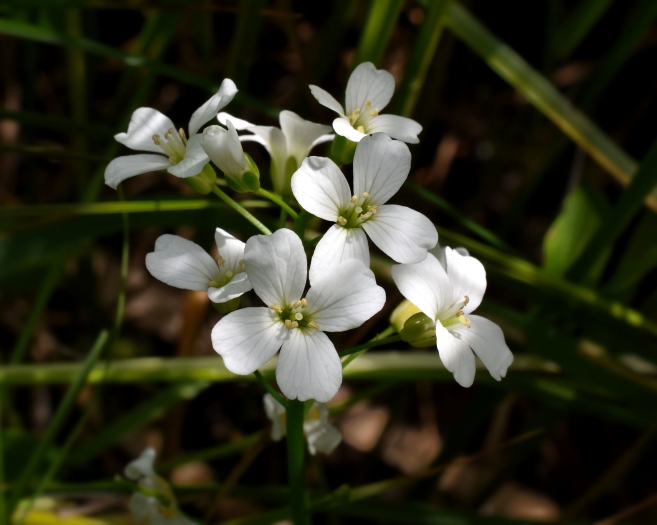Bulbous Bittercress
(Cardamine bulbosa)
Bulbous Bittercress (Cardamine bulbosa)
/
/

davecz2
CC BY-SA 4.0
Image By:
davecz2
Recorded By:
Copyright:
CC BY-SA 4.0
Copyright Notice:
Photo by: davecz2 | License Type: CC BY-SA 4.0 | License URL: http://creativecommons.org/licenses/by-sa/4.0/ | Rights Holder: davecz2 | Publisher: iNaturalist | Date Created: 2017-05-27T07:34:47-07:00 |

























Estimated Native Range
Summary
Cardamine bulbosa, commonly known as bulbous bittercress, is a perennial herb that thrives in the moist, rich soils of floodplain forests, marshes, and swamps in eastern North America. It typically grows 4-24 inches tall and forms clumps with small, rounded, basal leaves. The plant produces clusters of delicate white flowers from April to June, which are modest in size but can be quite numerous, giving a showy display. After flowering, it forms slender, elongated seed pods. Bulbous bittercress is valued for its early-season blooms and its ability to naturalize in wetland gardens.
In cultivation, bulbous bittercress is appreciated for its edible leaves, which have a peppery flavor similar to watercress, and are a welcome addition to salads and garnishes. It is often used in native plant gardens, rain gardens, and as a ground cover in moist, shaded areas. This plant prefers consistently moist to wet soils and can tolerate partial shade to full sun conditions. While it is not commonly afflicted by diseases, it can be sensitive to drought and may require additional watering during dry periods. Bulbous bittercress is not typically invasive but can self-seed in ideal conditions.CC BY-SA 4.0
In cultivation, bulbous bittercress is appreciated for its edible leaves, which have a peppery flavor similar to watercress, and are a welcome addition to salads and garnishes. It is often used in native plant gardens, rain gardens, and as a ground cover in moist, shaded areas. This plant prefers consistently moist to wet soils and can tolerate partial shade to full sun conditions. While it is not commonly afflicted by diseases, it can be sensitive to drought and may require additional watering during dry periods. Bulbous bittercress is not typically invasive but can self-seed in ideal conditions.CC BY-SA 4.0
Plant Description
- Plant Type: Herb
- Height: 0.75-1.4 feet
- Width: 0.75-1 feet
- Growth Rate: Rapid
- Flower Color: Pink, White
- Flowering Season: Spring, Summer
- Leaf Retention: Deciduous
Growth Requirements
- Sun: Part Shade, Full Shade
- Water: Medium
- Drainage: Medium, Slow
Common Uses
Bee Garden, Erosion Control, Low Maintenance, Water Garden
Natural Habitat
Moist soils of floodplain forests, marshes, and swamps in eastern North America
Other Names
Common Names: Spring Cress, Bitter Cress, Bulb Bittercress, Bulbous Cress
Scientific Names: , Cardamine bulbosa, Arabis amara, Arabis amara, Arabis bulbosa, Arabis bulbosa, Arabis rhomboidea, Cardamine bulbosa f. bulbosa, Cardamine bulbosa f. fontinalis, Cardamine bulbosa var. purpurea
GBIF Accepted Name: